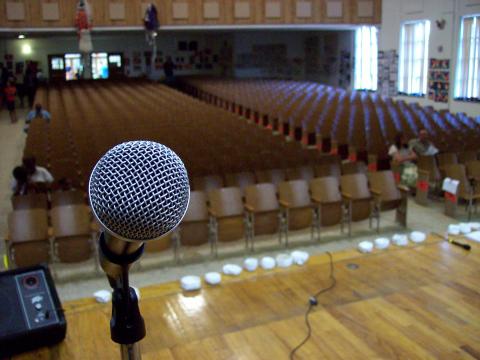Notes from CAMP
Every year, the Committee on Ancient and Modern Performance (CAMP) presents a script-in-hand reading of an ancient play, or a modern play with classical themes. Our goal is twofold. First, CAMP seeks to promote the exploration of ancient performance texts through their intended medium. Second, the CAMP performance provides members of the SCS with the opportunity to engage in the scholarship of performance. This opportunity is particularly important to scholars without the resources to peruse performance work at their home institutions.
When John Franklin proposed Euripides’ Helen for the 2021 meeting in Chicago, we were delighted. Not only is the Helen a fascinating text, but John and his collaborators composed a score for the play that closely mimicked the type of orchestration used in Euripides’ day. CAMP welcomed the chance to experiment with musical performance in a way that we had never been able to do before. When John convinced experienced CAMPer Mary-Kay Gamel to direct, it was clear that this would be a notable CAMP performance.
All our plans changed in the Spring, when it became clear that coronavirus would force the annual conference into a virtual space. However, John and Mary-Kay were undaunted. They made a virtue out of necessity, and undertook the challenge of using Zoom as a performance medium. Over the past few months, we have experimented with the visual and audio potential of the platform as we explored the nuances of the text. This CAMP production will certainly be a show unlike any other.
-
Krishni Burns (CAMP Chair)
My original motive for proposing this CAMP production was to share with the Classics community my "new ancient music" for a 2018 production of Helen in Burlington, Vermont (https://www.didaskalia.net/issues/15/14/). We all know by now what a difference it makes to have at least some kind of music provided for the original choral passages. But the effect can be quite ear-opening when music follows ancient rhythms as strictly as possible (some ambiguities must always be interpreted) and employs harmonic and melodic material and approaches from surviving ancient scores and theoretical writings.
I first pursued this method in 1999 with a score for Libation Bearers at the Twelfth London Festival of Greek Drama (1999) and Clouds at the Edinburgh Fringe (2000). More recently, a production of Heracles at Columbia/Barnard in 2019 involved a comparable approach with music by Anna Conser and Callum Armstrong on aulos. I proposed to the CAMP committee he bring my electric lyre to Chicago and perform this music live within a larger production to be developed by Mary-Kay Gamel and CAMP players.
After the in-person SCS was cancelled, we consulted with Krishni Burns and decided to attempt a Zoom production. With the lively cast that came forward, the larger production proceeds well. Online delivery of the music, however, is presenting serious challenges. Live performance in any form has become impossible, and even lip-synching or singing along to pre-recorded music must confront Zoom's limit of audio-streaming to a single screen-sharer—a fatal blow for songs involving alternation of parts (Parodos, Lyric Dialogue, Reunion Duet). Some form of pre-recording is inevitable, along with the reduction or elimination of several songs, including those with Helen and Menelaos. We thus lose one of the play's more distinctive elements—the combination of choral song with monodic solos. We can at least deliver some impression of the choral songs.
-
John Franklin (Helen Co-Director)
I was delighted when John Franklin asked me to participate in a CAMP production of his version of Euripides’ Helen. During my graduate education at the University of California at Berkeley I studied drama of all kinds, primarily classics. In 1973 I became a faculty member at UC Santa Cruz, where I taught Classics, Comparative Literature, and Theater Arts, writing translations of drama, articles and reviews, giving lectures and directing many productions in the U.S. and abroad.
I retired from teaching in 2015, but continue to work on drama whenever the opportunity arises. I created and staged a translation of Euripides' Helen in 2008 in Sonoma, where I now live. I was delighted when John invited me to join his production of Helen, staged with his original music, and I was immensely impressed by the video he showed me. But then I learned that because of the pandemic the new production would be staged via Zoom, "an easy, reliable cloud platform for video and audio conferencing." I knew nothing about Zoom, but John and his assistant Krishni Burns do, and they are helping me to master this new technique. In Zoom the actors perform in different spaces, and their video scenes are integrated into a whole, with backdrops and special effects which are often quite captivating. I am gradually learning how to work with this new technique and I've found it's an exciting new way to present classical material!
-
Mary-Kay Gamel (Helen Co-Director)

